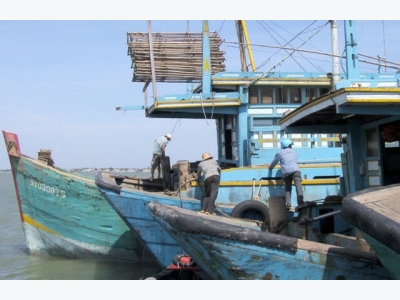Seafood exporters fret over EU yellow card risk

Fishing in Vietnam needs to be more sustainable than IUU requires - Photo: TRAN MANH
Ho Chi Minh City – Seafood exporters are extremely anxious about the risk of receiving a yellow card warning from the European Union (EU) towards Vietnamese products which will lead to costly and time-consuming export procedures, heard a conference on illegal, unreported and unregulated (IUU) fishing in HCMC on September 25.
The Directorate-General for Maritime Affairs and Fisheries under the European Commission made five recommendations after its Vietnam-based review in mid-May. If Vietnam still does not meet the EU’s requirements prior to this Saturday, the EU will give the country a yellow card warning.
Vu Thi Thu Sac, vice chairwoman of the Vietnam Association of Seafood Exporters and Producers (VASEP), said at the conference that the workload on compliance would be very heavy, including the amendment to relevant laws, the management of the fishing fleet, fishing, and seafood traceability.
She stressed boat owners should be aware of risks from illegal fishing. “It requires a lot of time to do this. But this is an opportunity to restore order, build and strengthen fishing in a more proper manner. We have no other choice,” she said.
Nguyen Hai Nam, deputy general secretary of VASEP, said a yellow card warning would have a knock-on effect on seafood exports to the EU, the United States, and other potential markets. Outbound sales of local seafood products generate US$1.9-2.2 billion a year, with each of the EU and the U.S. making up 16-17% of the total, or US$350-400 million a year.
Vu Quang Vinh, deputy general director of CJ Cau Tre Food JSC, said his company has shipped its products to the EU for around 30 years, so it has become familiar with the market’s tight regulations.
However, he added, the EU will not only review some local enterprises but the whole industry, including a host of other smaller firms. Therefore, if the EU checks these enterprises and issues the yellow card warning, the whole sector will be affected.
Ngo Viet Hoai, deputy general director of Ba Ria-Vung Tau Seafood Processing Import - Export JSC, or Baseafood, said if this comes true, all of seafood export containers to the EU would be checked within three or four weeks.
If the goods is cleared, exporters would incur an extra cost of around 600-700 euros each container at ports. Otherwise, it would cost them about 4,000-5000 euros for each container which is returned, with product damage excluded.
“Sharp increases in costs will make it difficult for (local) enterprises to compete with exporters from other countries to the EU,” he noted.
The possibility of receiving the yellow card warning is high, said Vu Van Tam, Deputy Minister of Agriculture and Rural Development. Therefore, he urged VASEP, enterprises, and State management agencies to take action to prevent the situation. If the EU issues the warning, this will be a chance to restore order and reorganize seafood production with an aim to develop the fishing sector in a responsible way.
Related news
 Oysters loom large in Fish 2.0 finals
Oysters loom large in Fish 2.0 finals A measure of the innovative ideas emerging from, and being devoted to, the US shellfish farming sector.
 Exporters anxious to fight illegal fishing
Exporters anxious to fight illegal fishing Vietnam’s export of seafood to the European Union (EU) may fall sharply or even face EU’s “yellow card” if the country cannot meet the EU’s requirements
 Seafood sector sets low export target for 2020
Seafood sector sets low export target for 2020 The Government has set a modest export revenue target of US$8-9 billion for the seafood industry in 2020, which is seen low as the sector can fetch US$8 billion